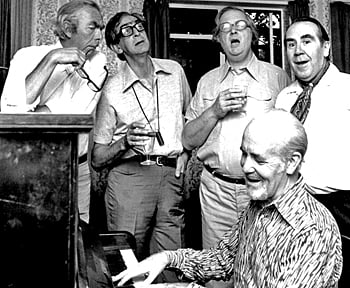Nice Above Fold - Page 1019
Jim Lehrer takes his own advice: Make sure it matters to you
Two decades ago, Jim Lehrer and Robert MacNeil gave public television a kind of news program that contrasted greatly with the aims of big-network journalism, and the distinction has grown year by year with the decay of the network news divisions. Contributing Editor David Stewart, retired director of international activities at CPB, profiled Lehrer for a forthcoming book on the major programs of public TV. In 1970, on a steaming summer morning in Dallas, I walked into a large room of the public TV station KERA and met Jim Lehrer for the first time. He was seated alone at the end of a long rectangular table, its surface strewn with daily papers, reporters’ notes, overflowing ashtrays and half-empty mugs of coffee.Minnesota net endows itself with sale of mail-order firm
With the $120-million sale of for-profit sister company Rivertown Trading to Dayton Hudson, Minnesota Public Radio (MPR) gains a secure subsidy while ridding itself of a longtime public relations problem. The Minnesota Communications Group–parent of MPR and the for-profit Greenspring Co.–announced March 23 it was selling the catalog business to the Minneapolis-based retail giant, parent of department store chains including Target and Marshall Field. MPR and Greenspring President Bill Kling and two other top execs share the bulk of $7.3 million in payouts under a plan previously laid down by their boards of directors. But the big beneficiary is MPR, which gets about $90 million of the net proceeds to add to its existing $19 million endowment fund, giving it by far the largest endowment in public radio.Fred Friendly: ‘a tough man but, my God, full of ideas’
Fred W. Friendly, the legendary CBS News producer who tried to bring innovation to public TV in the 1960s and later developed a celebrated series of televised seminars on major public policy issues, died March 3 at his home in New York City. He was 82. “He was a great broadcaster, a great innovator, a great friend of public television,” observed PBS President Ervin Duggan in a release. At CBS, Friendly worked for years with Edward R. Murrow, producing many of his appearances, including the milestone 1954 report that questioned Sen. Joseph McCarthy’s anti-communist campaign and the famous CBS Reports: “Harvest of Shame” on the lives of migrant workers, aired in 1960.
Merger: we're not talking now, but we might be talking later
It may be a simple question–are PRI and NPR talking about a merger?–but that doesn’t mean it gets a simple answer. To keep their options open, the presidents of the two networks are employing nuances that reach beyond the English of newspaper headlines and into metaphysical realms of potentiality. Asked to clarify their positions Feb. 19 [1998], NPR’s Delano Lewis said talks with PRI are still ongoing and PRI’s Stephen Salyer said they’re not, “currently.” Lewis was questioned at the NPR Board meeting after trade periodicals delivered conflicting assessments that both came from Salyer: “NPR-PRI merger talks are off, says Salyer,” said the headline of Current‘s Feb.Seven years in a ‘dynamic environment’
Cecily Truett and Larry Lancit rolled the dice. In the spring of 1991, they took their production company and its best known product, and laid them at the feet of GKN Securities Corp., a small investment firm, which organized the initial public offering of their production company. By then, the Lancits had filled a trophy case with awards as producers of Reading Rainbow. But Lancit Media Productions’ earnings were barely enough to scrape by. It was certainly not enough to expand. Not enough to invest in future projects. Not enough for retirement. After years of constant funding struggles and hand-to-mouth existence, the odds of Wall Street looked good.Funny and civilized Frank Muir: patron of Pythons and radio games
Hands-up, all those who listen regularly to My Music, the half-hour radio panel game produced by the BBC and distributed by WFMT-FM in Chicago to about 60 public radio stations in the U.S. Ah, I see a hand there in the back. It’s all right, you may remain anonymous. How many, then, have heard of its companion program, My Word!? Two more. Let the four of us leave the room to recall some favorite segments from these superb series, two of the most civilized radio programs on the air today. I pose the questions and make the assertion at this time because the most important figure on both shows, Frank Muir, died in his sleep on Jan.
A rough few months for San Francisco's KALW
The KALW situation is marked by problems and issues resonant in public radio. Most familiar: distress with institutional licensee.Eh-oh!
Over the hills and far away, Teletubbies come to play. In Teletubbyland, a lush green landscape of undulating hills spotted with clumps of bright flowers, the world is safe and fun — a place to explore and learn through play. We know this because the sun baby, who rises over the set at the beginning of each episode, gurgles, coos and shrieks with pleasure at the adventures of the Teletubbies, four alien yet adorable, toddlerlike beings who live there, cared for and entertained by otherworldly gadgets. Teletubbies, the groundbreaking BBC children’s series that’s prompted both an outcry and a massive consumer craze since its debut last March debut in Britain, is about to arrive in the PBS schedule, April 6.Fred Wiseman’s novelistic samplings of reality
As I write these words, Frederick Wiseman’s 30th film, Public Housing, is about to be broadcast, Dec. 1 [1998], through PBS, the national network that has presented all of his documentaries. It concerns the Ida B. Wells housing development on Chicago’s South Side. The sites of his past documentaries have varied from high schools to hospitals, from public parks to private playgrounds. He has shown us the inside of military and police units, welfare and model agencies, prisons, a primate research lab, a meat packing plant and a zoo. It is often said that Wiseman’s films are about institutions. This is almost accurate.We'll look back on this old Barney: an early input-output gizmo you could hug
Dolls have talked for years, but it was Microsoft’s ActiMates Interactive Barney that became a full-fledged peripheral for the computer–with hints of the nifty and bizarre stuff that will flood the world when digital broadcasting begins. Next month, at Toy Fair ’98 in New York City, the company is expected to announce the addition of an Arthur doll to the ActiMates line, and Children’s Television Workshop will introduce a similar smart doll of its own. And if the technology inside these little wriggling, sensing and talking input-output dolls develops as rapidly as other digital devices do, in a few years we’ll see smarter descendants become tools and toys for older kids and adults as well.Teletubbies in Britain: craze, controversy and consumer frenzy
Teletubbies haven’t officially landed in the U.S. public TV schedule yet, but they’ve already roused controversy in Britain and landed a great big licensing deal over here. Hasbro, makers of Playskool Baby and other major toy brands, will introduce a range of Teletubbies products–soft toys, figures, games, puzzles, bath toys and other items–by next fall. “It was important to find a partner who understands that young children need to be nurtured, not exploited,” said Kenn Viselman, president of the itsy bitsy Entertainment Co., which holds licensing rights to Teletubbies in the U.S. and Canada. Teletubbies, the children’s TV program that sparked both a craze and outrage in Britain with its debut on BBC2 this year, will begin airing on PBS’s Ready to Learn Service in April.FCC to WTTW: too much of that funky stuff
WTTW and PBS say they’re baffled by the FCC’s proposal to fine the Chicago station $5,000 for airing four underwriting spots, including one that aired nationally on Wall Street Week. The commission sent a “notice of apparent liability” to WTTW [text of notice] earlier this month, saying that spots aired in November 1996 for Zenith, Amoco, Prudential Securities and Sun America insurance violate FCC rules against advertisements for for-profit companies. Under the rules, public broadcasters can air credits for corporate underwriting but only for the purpose of identifying backers. The credits are not supposed to promote their businesses. Specifically off-limits are comparative and qualitative descriptions, price information, calls to action and inducements to buy.FCC notice to WTTW of fines for underwriting violations, 1997
In 1997, the FCC fined Chicago public TV station WTTW for violating commission standards for underwriting credits (Current coverage). More than two years later, the commission found that three of the four contested credits were permissible, and reduced the fine (text of March 2000 order). Federal Communications Commission Washington, D.C. 20554 In reply refer to: 1800C1-KMS 97040529 December 2, 1997 Released: December 3, 1997 CERTIFIED MAIL — RETURN RECEIPT REQUESTED Window to the World Communications, Inc. Licensee, Station WTTW(TV) 5400 North St. Louis Ave. Chicago, IL 60625 Dear Licensee: This letter constitutes a NOTICE OF APPARENT LIABILITY FOR A FORFEITURE pursuant to Section 503(b) of the Communications Act of 1934, as amended (the “Act”), for violations of 47 U.S.C.Managers try to form a more perfect union
Austin, Tex. — The Convention of Stations on Nov. 5 [1997] created a Forum for public TV’s national decision-making, opening the way for new cooperation in the fragmented field as well as new varieties of bickering. The new Forum may find itself locking horns with PBS’s board, for instance. Several backers spoke of the Forum as a means of giving guidance to PBS and reallocating functions in the field. The Core Working Group that proposed the Forum is now planning to hold elections as soon as December for the 13-member Council that will operate the Forum. One of the Council’s first tasks will be planning for the Forum’s first meeting, already scheduled for March 22, just before the annual APTS Capitol Hill Day, in Washington, D.C.Public TV defender, visionary Ralph Rogers dies in Dallas
Ralph B. Rogers, the Dallas businessman who re-founded and perhaps saved PBS in the early 1970s, died Nov. 4 after a long illness. He was 87. In business, Rogers was millionaire founder and, until recently, chairman of Texas Industries, a concrete and building materials firm now known as TXI. But in his civic life, he was many men–“one of the last survivors of a generation of leaders who shaped Dallas after World War II,” according to the Dallas Morning News. He not only revived KERA-FM/TV in his hometown and intervened in PBS history at a crucial moment, headed major fund drives that built the Dallas Symphony and Parkland Hospital.
Featured Jobs





